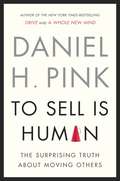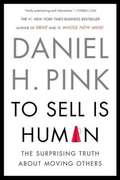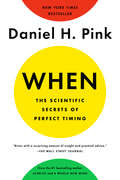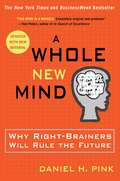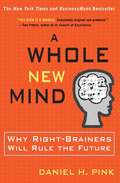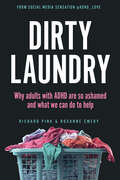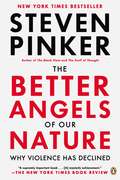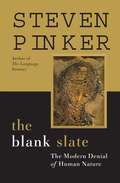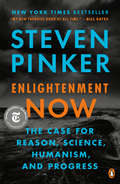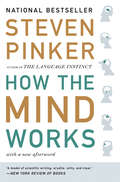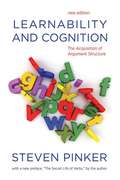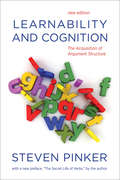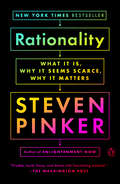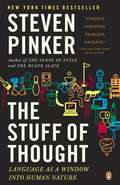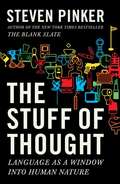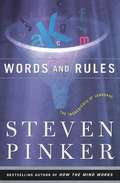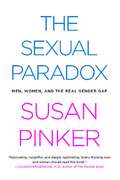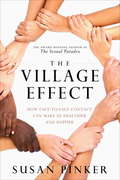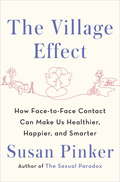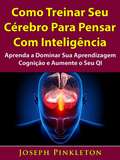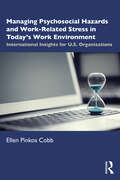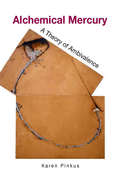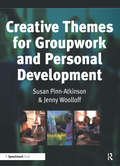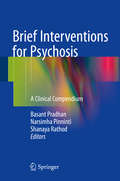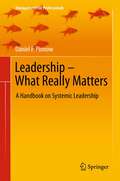- Table View
- List View
To Sell Is Human: The Surprising Truth about Moving Others
by Daniel H. Pink#1 New York Times Business Bestseller, #1 Wall Street Journal Business Bestseller, #1 Washington Post bestseller. From the bestselling author of Drive and A Whole New Mind comes a surprising--and surprisingly useful--new book that explores the power of selling in our lives. According to the U. S. Bureau of Labor Statistics, one in nine Americans works in sales. Every day more than fifteen million people earn their keep by persuading someone else to make a purchase. But dig deeper and a startling truth emerges: Yes, one in nine Americans works in sales. But so do the other eight. Whether we're employees pitching colleagues on a new idea, entrepreneurs enticing funders to invest, or parents and teachers cajoling children to study, we spend our days trying to move others. Like it or not, we're all in sales now. To Sell Is Human offers a fresh look at the art and science of selling. As he did in Drive and A Whole New Mind, Daniel H. Pink draws on a rich trove of social science for his counterintuitive insights. He reveals the new ABCs of moving others (it's no longer "Always Be Closing"), explains why extroverts don't make the best salespeople, and shows how giving people an "off-ramp" for their actions can matter more than actually changing their minds. Along the way, Pink describes the six successors to the elevator pitch, the three rules for understanding another's perspective, the five frames that can make your message clearer and more persuasive, and much more. The result is a perceptive and practical book--one that will change how you see the world and transform what you do at work, at school, and at home.
To Sell Is Human
by Daniel H. Pink#1 New York Times Business Bestseller #1 Wall Street Journal Business Bestseller #1 Washington Post bestseller From the bestselling author of Drive and A Whole New Mind comes a surprising--and surprisingly useful--new book that explores the power of selling in our lives. According to the U. S. Bureau of Labor Statistics, one in nine Americans works in sales. Every day more than fifteen million people earn their keep by persuading someone else to make a purchase. But dig deeper and a startling truth emerges: Yes, one in nine Americans works in sales. B ut so do the other eight. Whether we’re employees pitching colleagues on a new idea, entrepreneurs enticing funders to invest, or parents and teachers cajoling children to study, we spend our days trying to move others. Like it or not, we’re all in sales now. To Sell Is Human offers a fresh look at the art and science of selling. As he did in Drive and A Whole New Mind, Daniel H. Pink draws on a rich trove of social science for his counterintuitive insights. He reveals the new ABCs of moving others (it's no longer "Always Be Closing"), explains why extraverts don't make the best salespeople, and shows how giving people an "off-ramp" for their actions can matter more than actually changing their minds. Along the way, Pink describes the six successors to the elevator pitch, the three rules for understanding another's perspective, the five frames that can make your message clearer and more persuasive, and much more. The result is a perceptive and practical book--one that will change how you see the world and transform what you do at work, at school, and at home. .
When: The Scientific Secrets of Perfect Timing
by Daniel H. Pink<P>Daniel H. Pink, the #1 bestselling author of Drive and To Sell Is Human, unlocks the scientific secrets to good timing to help you flourish at work, at school, and at home. <P>Everyone knows that timing is everything. But we don't know much about timing itself. Our lives are a never-ending stream of "when" decisions: when to start a business, schedule a class, get serious about a person. Yet we make those decisions based on intuition and guesswork. <P>Timing, it's often assumed, is an art. In When: The Scientific Secrets of Perfect Timing, Pink shows that timing is really a science. <P>Drawing on a rich trove of research from psychology, biology, and economics, Pink reveals how best to live, work, and succeed. How can we use the hidden patterns of the day to build the ideal schedule? Why do certain breaks dramatically improve student test scores? How can we turn a stumbling beginning into a fresh start? Why should we avoid going to the hospital in the afternoon? Why is singing in time with other people as good for you as exercise? And what is the ideal time to quit a job, switch careers, or get married? <P>In When, Pink distills cutting-edge research and data on timing and synthesizes them into a fascinating, readable narrative packed with irresistible stories and practical takeaways that give readers compelling insights into how we can live richer, more engaged lives. <P><b>A New York Times Bestseller</b>
A Whole New Mind
by Daniel H. PinkThe future belongs to a different kind of person with a different kind of mind: artists, inventors, storytellers-creative and holistic "right-brain" thinkers whose abilities mark the fault line between who gets ahead and who doesn't.Drawing on research from around the world, Pink (author of To Sell Is Human: The Surprising Truth About Motivating Others) outlines the six fundamentally human abilities that are absolute essentials for professional success and personal fulfillment--and reveals how to master them. A Whole New Mind takes readers to a daring new place, and a provocative and necessary new way of thinking about a future that's already here.
A Whole New Mind: Why Right-Brainers Will Rule The Future
by Daniel H. PinkLawyers. Accountants. Radiologists. Software engineers. That's what our parents encouraged us to become when we grew up. But Mom and Dad were wrong. The future belongs to a very different kind of person with a very different kind of mind. The era of "left brain" dominance, and the Information Age that it engendered, are giving way to a new world in which "right brain" qualities-inventiveness, empathy, meaning-predominate. That's the argument at the center of this provocative and original book, which uses the two sides of our brains as a metaphor for understanding the contours of our times. In the tradition of Emotional Intelligence and Now, Discover Your Strengths, Daniel H. Pink offers a fresh look at what it takes to excel. A Whole New Mind reveals the six essential aptitudes on which professional success and personal fulfillment now depend, and includes a series of hands-on exercises culled from experts around the world to help readers sharpen the necessary abilities. This book will change not only how we see the world but how we experience it as well.
Dirty Laundry: Why Adults with ADHD Are So Ashamed and What We Can Do to Help
by Richard Pink Roxanne EmeryAn empowering and witty guide to banishing shame and living your fullest life with ADHD—plus tips for loved ones on helping them navigate this world, too—from viral duo ADHD_Love. What if you stopped feeling ashamed of constantly being late or of getting so hyperfocused on a task that you drop everything else you had to do? How can you as a partner, parent, or friend better understand your neurodivergent loved one&’s way of moving through the world? In Dirty Laundry, life partners Rich Pink and Rox Emery unapologetically guide you through the ups and downs of life with ADHD. Every chapter starts with a common symptom of ADHD, like impulsivity or struggles with finances, and an earnest moment from their own lives to show you how they navigate the symptom together. Rox reminds you to be kind to yourself and love yourself for who you are; Rich offers tips on how he uses compassion and honesty instead of jumping to conclusions. Whether it's helping your ADHDer with friendly time-checks before an appointment or reminding yourself to take breaks during hours spent hyperfocusing on a new project, Rox and Rich give you the tools to destigmatize and normalize life with ADHD.
The Better Angels of Our Nature: Why Violence Has Declined (Playaway Adult Nonfiction Ser.)
by Steven PinkerFaced with the ceaseless stream of news about war, crime, and terrorism, one could easily think we live in the most violent age ever seen. Yet as New York Times bestselling author Steven Pinker shows in this startling and engaging new work, just the opposite is true: violence has been diminishing for millennia and we may be living in the most peaceful time in our species's existence. For most of history, war, slavery, infanticide, child abuse, assassinations, pogroms, gruesome punishments, deadly quarrels, and genocide were ordinary features of life. But today, Pinker shows (with the help of more than a hundred graphs and maps) all these forms of violence have dwindled and are widely condemned. How has this happened?<P><P> This groundbreaking book continues Pinker's exploration of the essence of human nature, mixing psychology and history to provide a remarkable picture of an increasingly nonviolent world. The key, he explains, is to understand our intrinsic motives- the inner demons that incline us toward violence and the better angels that steer us away-and how changing circumstances have allowed our better angels to prevail. Exploding fatalist myths about humankind's inherent violence and the curse of modernity, this ambitious and provocative book is sure to be hotly debated in living rooms and the Pentagon alike, and will challenge and change the way we think about our society.<P> Chosen for Mark Zuckerberg's "A Year of Books" <P><b>A New York Times Bestseller</b>
The Blank Slate: The Modern Denial of Human Nature
by Steven PinkerThe Blank Slate shows how many intellectuals have denied the existence of human nature by embracing three linked dogmas: the Blank Slate, the Noble Savage, and the Ghost in the Machine. Each dogma carries a moral burden, so their defenders have engaged in desperate tactics to discredit the scientists who are now challenging them.
Enlightenment Now: The Case for Reason, Science, Humanism, and Progress
by Steven Pinker<P> If you think the world is coming to an end, think again. Steven Pinker presents the big picture of human progress: people are living longer, healthier, freer, and happier lives, and while our problems are formidable, the solutions lie in the Enlightenment ideal of using reason and science.Is the world really falling apart? Is the ideal of progress obsolete? <P> In this elegant assessment of the human condition in the third millennium, cognitive scientist and public intellectual Steven Pinker urges us to step back from the gory headlines and prophecies of doom, which play to our psychological biases. <P>Instead, follow the data: In seventy-five jaw-dropping graphs, Pinker shows that life, health, prosperity, safety, peace, knowledge, and happiness are on the rise, not just in the West, but worldwide. This progress is not the result of some cosmic force. It is a gift of the Enlightenment: the conviction that reason and science can enhance human flourishing.Far from being a naïve hope, the Enlightenment, we now know, has worked. But more than ever, it needs a vigorous defense. <P>The Enlightenment project swims against currents of human nature--tribalism, authoritarianism, demonization, magical thinking--which demagogues are all too willing to exploit. Many commentators, committed to political, religious, or romantic ideologies, fight a rearguard action against it. The result is a corrosive fatalism and a willingness to wreck the precious institutions of liberal democracy and global cooperation. With intellectual depth and literary flair, Enlightenment Now makes the case for reason, science, and humanism: the ideals we need to confront our problems and continue our progress. <P><b>A New York Times Bestseller</b>
How the Mind Works
by Steven Pinker"A model of scientific writing: erudite, witty, and clear." --New York Review of Books In this Pulitzer Prize finalist and national bestseller, one of the world's leading cognitive scientists tackles the workings of the human mind. What makes us rational--and why are we so often irrational? How do we see in three dimensions? What makes us happy, afraid, angry, disgusted, or sexually aroused? Why do we fall in love? And how do we grapple with the imponderables of morality, religion, and consciousness? ?How the Mind Works? synthesizes the most satisfying explanations of our mental life from cognitive science, evolutionary biology, and other fields to explain what the mind is, how it evolved, and how it allows us to see, think, feel, laugh, interact, enjoy the arts, and contemplate the mysteries of life. This new edition of Pinker's bold and buoyant classic is updated with a new foreword by the author.
Learnability and Cognition: The Acquisition of Argument Structure (new edition)
by Steven PinkerBefore Steven Pinker wrote bestsellers on language and human nature, he wrote severaltechnical monographs on language acquisition that have become classics in cognitive science. Learnability and Cognition, first published in 1989, brought together two bigtopics: how do children learn their mother tongue, and how does the mind represent basic categoriesof meaning such as space, time, causality, agency, and goals? The stage for this synthesis was setby the fact that when children learn a language, they come to make surprisingly subtle distinctions:pour water into the glass and fill the glass with water soundnatural, but pour the glass with water and fill water into theglass sound odd. How can this happen, given that children are not reliably corrected foruttering odd sentences, and they don't just parrot back the correct ones they hear from theirparents? Pinker resolves this paradox with a theory of how children acquire the meaning and uses ofverbs, and explores that theory's implications for language, thought, and the relationship betweenthem. As Pinker writes in a new preface, "The Secret Life of Verbs," thephenomena and ideas he explored in this book inspired his 2007 bestseller The Stuff ofThought: Language as a Window into Human Nature. These technical discussions, he notes,provide insight not just into language acquisition but into literary metaphor, scientificunderstanding, political discourse, and even the conceptions of sexuality that go intoobscenity.
Learnability and Cognition, new edition: The Acquisition of Argument Structure (Learning, Development, and Conceptual Change)
by Steven PinkerA classic book about language acquisition and conceptual structure, with a new preface by the author, "The Secret Life of Verbs."Before Steven Pinker wrote bestsellers on language and human nature, he wrote several technical monographs on language acquisition that have become classics in cognitive science. Learnability and Cognition, first published in 1989, brought together two big topics: how do children learn their mother tongue, and how does the mind represent basic categories of meaning such as space, time, causality, agency, and goals? The stage for this synthesis was set by the fact that when children learn a language, they come to make surprisingly subtle distinctions: pour water into the glass and fill the glass with water sound natural, but pour the glass with water and fill water into the glass sound odd. How can this happen, given that children are not reliably corrected for uttering odd sentences, and they don't just parrot back the correct ones they hear from their parents? Pinker resolves this paradox with a theory of how children acquire the meaning and uses of verbs, and explores that theory's implications for language, thought, and the relationship between them.As Pinker writes in a new preface, "The Secret Life of Verbs," the phenomena and ideas he explored in this book inspired his 2007 bestseller The Stuff of Thought: Language as a Window into Human Nature. These technical discussions, he notes, provide insight not just into language acquisition but into literary metaphor, scientific understanding, political discourse, and even the conceptions of sexuality that go into obscenity.
Rationality: What It Is, Why It Seems Scarce, Why It Matters
by Steven PinkerCan reading a book make you more rational? Can it help us understand why there is so much irrationality in the world? Steven Pinker, author of Enlightenment Now (Bill Gates’s "new favorite book of all time”) answers all the questions here. <p><p> Today humanity is reaching new heights of scientific understanding--and also appears to be losing its mind. How can a species that developed vaccines for Covid-19 in less than a year produce so much fake news, medical quackery, and conspiracy theorizing? Pinker rejects the cynical cliché that humans are simply irrational--cavemen out of time saddled with biases, fallacies, and illusions. After all, we discovered the laws of nature, lengthened and enriched our lives, and set out the benchmarks for rationality itself. <p><p> We actually think in ways that are sensible in the low-tech contexts in which we spend most of our lives, but fail to take advantage of the powerful tools of reasoning we’ve discovered over the millennia: logic, critical thinking, probability, correlation and causation, and optimal ways to update beliefs and commit to choices individually and with others. These tools are not a standard part of our education, and have never been presented clearly and entertainingly in a single book--until now. <p><p> Rationality also explores its opposite: how the rational pursuit of self-interest, sectarian solidarity, and uplifting mythology can add up to crippling irrationality in a society. Collective rationality depends on norms that are explicitly designed to promote objectivity and truth. Rationality matters. It leads to better choices in our lives and in the public sphere, and is the ultimate driver of social justice and moral progress. Brimming with Pinker’s customary insight and humor, Rationality will enlighten, inspire, and empower.
The Stuff of Thought: Language as a Window into Human Nature
by Steven PinkerThis New York Times bestseller is an exciting and fearless investigation of language Bestselling author Steven Pinker possesses that rare combination of scientific aptitude and verbal eloquence that enables him to provide lucid explanations of deep and powerful ideas. His previous books?including the Pulitzer Prize finalist The Blank Slate?have catapulted him into the limelight as one of today?s most important popular science writers. In The Stuff of Thought, Pinker presents a fascinating look at how our words explain our nature. Considering scientific questions with examples from everyday life, The Stuff of Thought is a brilliantly crafted and highly readable work that will appeal to fans of everything from The Selfish Gene and Blink to Eats, Shoots & Leaves.
The Stuff of Thought: Language as a Window into Human Nature
by Steven PinkerThe author explains how the mind works by examining the way we use words. Pinker takes on scientific questions - such as how language affects thought, and which of our concepts are innate - as well as questions from the headlines and everyday life.
Words and Rules: The Ingredients of Language
by Steven PinkerPinker (psychology, MIT) explains the mysteries of language, such as why languages change over time and how children learn their native language, by dissecting the idea that language comprises a mental dictionary of memorized words and a mental grammar of creative rules. Pinker connects a remarkable number of topics such as the attempts to simulate language using computers; the nature of human concepts; the peculiarities of the English language; and the theories of Noam Chomsky, through a minute dissection of the phenomenon of regular and irregular verbs. Annotation c. Book News, Inc., Portland, OR (booknews.com)
The Sexual Paradox: Men, Women and the Real Gender Gap
by Susan PinkerSusan Pinker, psychologist and award-winning columnist, has written a groundbreaking and controversial book that reveals why learning and behavioral gaps between boys and girls in the classroom are reversed in the workplace. Pinker examines how fundamental sex differences play out over the life span. By comparing fragile boys who succeed later with high-achieving women who opt out or plateau in their careers, Pinker turns several assumptions upside down: that women and men are biologically equivalent, that intelligence is all it takes to succeed, and that women are just versions of men, with identical interests and goals. In lively prose, Pinker guides readers through the latest findings in neuroscience and economics while addressing these questions: Are males the more fragile sex? What do men with Asperger syndrome or dyslexia tell us about more average men? Which sex is the happiest at work? Why do some male college dropouts earn more than the bright girls who sat beside them in third grade? After three decades of women's educational coups, why do men outnumber women in corporate law, engineering, physical science, and politics? The answers to these questions are the opposite of what we expect. A provocative examination of how and why learning and behavioral gaps in the nursery are reversed in the boardroom, this illuminating book reveals how sex differences influence career choices and ambition. Through the stories of real men and women, science, and examples from popular culture, Susan Pinker takes a new look at the differences between women and men.
The Village Effect
by Susan PinkerIn her surprising, entertaining and persuasive new book, award-winning author and psychologist Susan Pinker shows how face-to-face contact is crucial for learning, happiness, resilience and longevity. From birth to death, human beings are hard-wired to connect to other human beings. Face to face contact matters: tight bonds of friendship and love heal us, help children learn, extend our lives and make us happy. Looser in-person bonds matter, too, combining with our close relationships to form a personal "village" around us, one that exerts unique effects. And not just any social networks will do: we need the real, face-to-face, in-the-flesh encounters that tie human families, groups of friends and communities together. Marrying the findings of the new field of social neuroscience together with gripping human stories, Susan Pinker explores the impact of face-to-face contact from cradle to grave, from city to Sardinian mountain village, from classroom to workplace, from love to marriage to divorce. Her results are enlightening and enlivening, and they challenge our assumptions. Most of us have left the literal village behind, and don't want to give up our new technologies to go back there. But, as Pinker writes so compellingly, we need close social bonds and uninterrupted face-time with our friends and families in order to thrive--even to survive. Creating our own "village effect" can make us happier. It can also save our lives.From the Hardcover edition.
The Village Effect
by Susan PinkerIn her surprising, entertaining, and persuasive new book, award-winning author and psychologist Susan Pinker shows how face-to-face contact is crucial for learning, happiness, resilience, and longevity. From birth to death, human beings are hardwired to connect to other human beings. Face-to-face contact matters: tight bonds of friendship and love heal us, help children learn, extend our lives, and make us happy. Looser in-person bonds matter, too, combining with our close relationships to form a personal "village" around us, one that exerts unique effects. Not just any social networks will do: we need the real, in-the-flesh encounters that tie human families, groups of friends, and communities together. Marrying the findings of the new field of social neuroscience with gripping human stories, Susan Pinker explores the impact of face-to-face contact from cradle to grave, from city to Sardinian mountain village, from classroom to workplace, from love to marriage to divorce. Her results are enlightening and enlivening, and they challenge many of our assumptions. Most of us have left the literal village behind and don't want to give up our new technologies to go back there. But, as Pinker writes so compellingly, we need close social bonds and uninterrupted face-time with our friends and families in order to thrive--even to survive. Creating our own "village effect" makes us happier. It can also save our lives.Advance praise for The Village Effect "A terrific book . . . Pinker makes a hardheaded case for a softhearted virtue. Read this book. Then talk about it--in person!--with a friend."--Daniel H. Pink, New York Times bestselling author of Drive and To Sell Is Human "What do Sardinian men, Trader Joe's employees, and nuns have in common? Real social networks--though not the kind you'll find on Facebook or Twitter. Susan Pinker's delightful book shows why face-to-face interaction at home, school, and work makes us healthier, smarter, and more successful."--Charles Duhigg, New York Times bestselling author of The Power of Habit: Why We Do What We Do in Life and Business "Provocative and engaging . . . Pinker is a great storyteller and a thoughtful scholar. This is an important book, one that will shape how we think about the increasingly virtual world we all live in."--Paul Bloom, author of Just Babies: The Origins of Good and Evil "A fascinating, nuanced study of that most fundamental need: the need for human connection."--Maria Konnikova, New York Times bestselling author of Mastermind: How to Think Like Sherlock Holmes "The Village Effect is a fascinating explanation of why we need regular contact with people, not just screens--and why time spent with your neighbors will enrich and extend your life in ways you never imagined."--John Tierney, New York Times bestselling co-author of Willpower: Rediscovering the Greatest Human Strength "With a raft of surprising data, this compulsively readable, lively and meticulously researched book shows that direct and frequent human contact is at least as important to our survival as clean air or good nutrition."--Christina Hoff Sommers, author of Freedom Feminism: Its Surprising History and Why It Matters TodayFrom the Hardcover edition.
Como Treinar Seu Cérebro Para Pensar Com Inteligência: Aprenda a Dominar Sua Aprendizagem, Cognição e Aumente o Seu QI
by Joseph PinkletonVocê gostaria de ser capaz de pensar com inteligência de uma maneira clara? Por muito tempo as técnicas de pensamento inteligente e pensamento crítico tem sido utilizadas para melhoras todos os aspectos das vidas das pessoas! Utilizar o pensamento inteligente ajuda as pessoas a terem uma vida mais saudável e próspera. O que você aprenderá com o livro: - Fazer decisões inteligentes. - Melhorar Relacionamentos. - Melhorar seu potencial de Ganho. - Melhorar sua energia. - Melhorar sua saúde geral. + MUITO MAIS! --> Role para o topo da página e clique em “adicionar ao carrinho” pra comprar imediatamente
Managing Psychosocial Hazards and Work-Related Stress in Today’s Work Environment: International Insights for U.S. Organizations
by Ellen Pinkos CobbToday’s evolving world of work makes it imperative for employers to manage psychosocial hazards (PSH) and risks leading to work-related stress. This book contains essential, general and country-specific information and templates for the successful management of hazards so as to prevent psychological harm in the workplace. Acknowledged as global issues affecting all workers and industries, PSHs are work factors that have the potential to lead to physical or psychological injury and stress, relating to how work is designed, organized, and managed, and to work relationships and interactions. This book advances the idea that management of PSH and psychological health and safety is part of today’s responsible and ethical employers’ duty of care for employees, and that United States employers should recognize this responsibility. Easy to follow, this guide presents comprehensive information on addressing PSH, discussing measures taken internationally (laws, guidance, and resources from Europe, Canada, Mexico, Australia, and Japan), as well as a new global standard on psychological health and safety at work. Practitioners and students in the fields of management, occupational health and safety, human resource management, ethics and compliance, occupational health psychology, and organizational psychology will come away with a deeper understanding of the importance of PSH and their management.
Alchemical Mercury: A Theory of Ambivalence
by Karen PinkusPinkus (Italian, French and comparative literature, University of Southern California) takes the reader on a somewhat quixotic journey through the many visions of alchemy from antiquity to the present. She points out that the derivation of the word is uncertain. But this is appropriate since the definition of alchemy is also murky. Is it science or magic? Is it something as crass as turning lead into gold, or as rarified as a spiritual rebirth? While alchemies have existed for centuries, Pinkus spends the most time on the alchemical centuries, roughly (for nothing is definite) 1500-1800. She finds alchemical thoughts in Goethe, Lavoisier, the Rosicrucians and Marx among many others. Her own philosophy, as expressed through the nebulous, contradictory attitudes of thinkers toward the concept of alchemy is given with intelligence and humor. Alchemy is a metaphor but its shifting meaning is the root of this exploration into ambivalence. Annotation ©2010 Book News, Inc. , Portland, OR (booknews. com)
Creative Themes for Groupwork and Personal Development
by Susan Pinn-Atkinson Jenny WoolloffBased around thirty themes, this practical resource provides flexible and adaptable ideas for groupwork sessions. The themes in this book: can be adapted and developed to match the exact needs and interests of the participants; aim to generate and inspire group facilitators to think broadly and creatively, and to feel confident in using the culture and history of their geographical area to enrich the work they do with participants; enable participants to explore, develop and reflect upon their hidden, unidentified or unacknowledged strengths, transferable skills and knowledge; have a variety of alternative or additional ideas, and many are accompanied by worksheets; and include colour, television, soaps, touch, mirrors, maps, weather and many more.
Brief Interventions for Psychosis: A Clinical Compendium
by Narsimha Pinninti Shanaya Rathod Basant PradhanThis book offers a clinical guide that brings together a broad range of brief interventions and their applications in treating psychosis. It describes two core approaches that can narrow the current, substantial gap between the need for psychotherapeutic interventions for all individuals suffering from psychosis, and the limited mental health resources available. The first approach involves utilizing the standard therapeutic modalities in the context of routine clinical interactions after adapting them into brief and effective formats. To that end, the book brings in experts on various psychotherapeutic modalities, who discuss how their particular modality could be adapted to more effectively fit into the existing system of care delivery. The second approach, addressed in detail, is to extend the availability of these brief interventions by utilizing the circle of providers as well as the social circle of the clients so that these interventions can be provided in a coordinated and complementary manner by psychiatrists, psychologists, clinical social workers, case managers, peer support specialists and other providers on the one hand, and by family members, friends, social and religious institutions on the other.
Leadership - What Really Matters: A Handbook on Systemic Leadership
by Daniel F. PinnowWhat does really matter for daily leadership? How would a good and effective manager be characterized? Daniel F. Pinnow describes in a very illustrative way the essentials of collaborating with people in the business environment. This standard reference book exists as a 4th edition in German and is also available in Chinese. It provides a comprehensive and easy-to-understand overview over the most important leadership approaches in theory and practice. The credo of the author is: Leadership is an art of creating a world where others would love to join in.
